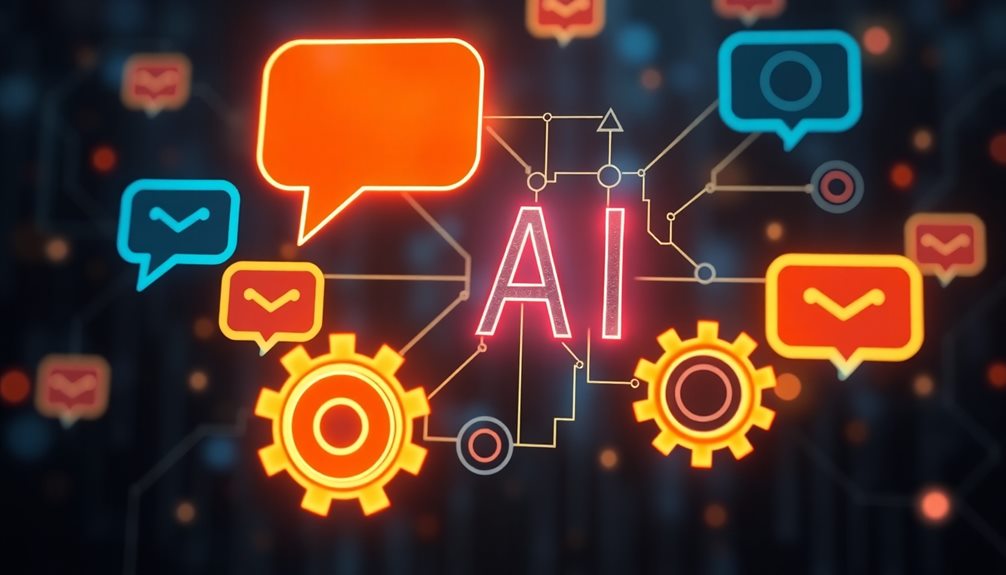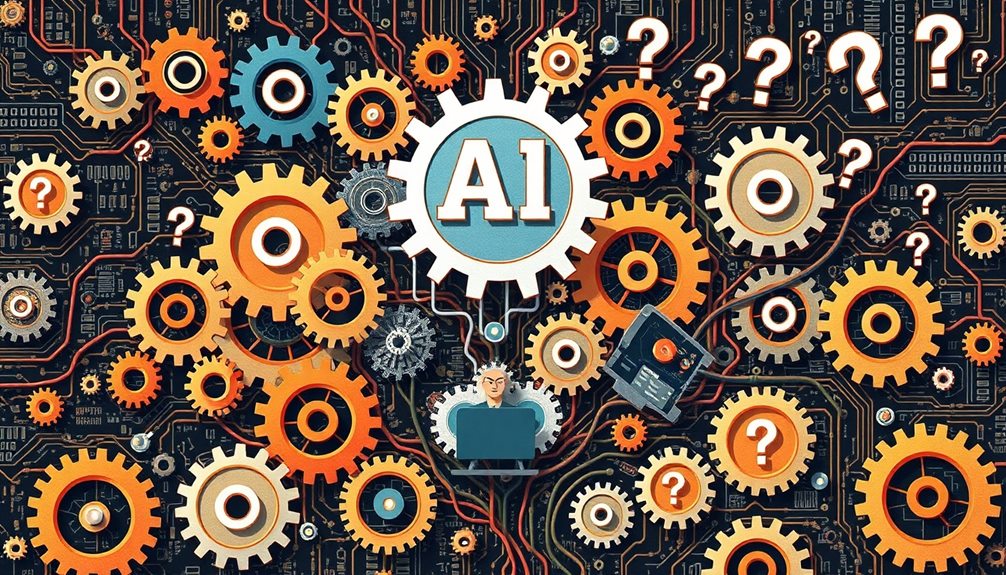AI-powered customer service systems are changing the game for businesses like yours. You can expect quicker response times, with chatbots providing 24/7 assistance and reducing wait times by up to 80%. These systems personalize interactions based on your customers' previous behaviors, creating tailored experiences that boost satisfaction and loyalty. Plus, they help your support agents be more efficient, allowing them to focus on complex issues. Embracing AI not only meets customer demands but also enhances operational productivity. If you're curious about how to implement these systems effectively, there's plenty more to uncover.
Key Takeaways
- AI chatbots provide 24/7 customer service, reducing response times by up to 80% and enhancing customer satisfaction.
- Predictive analytics enable AI systems to forecast customer needs, allowing for personalized and proactive service delivery.
- Continuous learning in AI improves accuracy and effectiveness, adapting to evolving customer preferences and behaviors.
- AI significantly boosts operational efficiency, increasing agent productivity by up to 14% and allowing focus on complex issues.
- Challenges such as skills gaps, employee resistance, and data privacy concerns must be addressed for successful AI implementation in customer service.
Understanding AI in Customer Service

When it comes to enhancing customer service, many businesses are turning to AI-powered systems. These systems utilize natural language processing and machine learning to automate customer interactions, offering instant responses that elevate the overall experience.
With 77% of customers expecting immediate service, AI chatbots are available 24/7 to address routine inquiries and FAQs, allowing human agents to focus on more complex issues. Recently, incidents like the Microsoft outage have highlighted the importance of reliable support systems, further driving the need for efficient customer service solutions.
By handling these routine inquiries, AI notably boosts service efficiency, increasing productivity by up to 14%. Additionally, AI systems leverage data analytics to personalize customer interactions.
With 59% of customers preferring tailored experiences, these systems adapt based on previous interactions and preferences, ensuring that each customer feels valued.
Continuous learning is vital for AI in customer service. Each interaction helps the system evolve, improving accuracy and effectiveness over time.
As you explore AI's role in customer service, you'll see how these technologies not only streamline processes but also enhance customer satisfaction by providing quick, personalized responses. Embracing AI can redefine your approach to customer service, ultimately leading to stronger customer relationships and greater loyalty.
Benefits of AI Systems

AI systems offer you instant response capabilities, ensuring your customers get the answers they need without delay.
With the latest advancements in machine learning algorithms, they also enhance personalization techniques, allowing you to tailor interactions based on individual preferences.
With operational efficiency gains, you'll find that your team can focus on complex tasks while AI handles the routine inquiries.
Instant Response Capability
In today's fast-paced world, instant response capability is essential for customer service success. With AI systems in place, you can provide instant responses to customer inquiries, which is increasingly what consumers prefer. In fact, 35% of customers favor interacting with AI chatbots over waiting for human agents to respond.
Here's a quick comparison of AI systems versus traditional customer service methods:
| Feature | AI Systems |
|---|---|
| Response Times | Reduced by up to 80% |
| Availability | 24/7 Service |
| Customer Engagement | Immediate Engagement |
| Efficiency | Supports multiple users |
| Customer Satisfaction | Enhanced by quick replies |
AI chatbots guarantee customer needs are met around the clock, enhancing customer satisfaction. In an era where 77% of customers expect immediate engagement, AI systems help meet these rising expectations. The efficiency of AI tools means you can manage more inquiries without the limitations of human staff, allowing you to focus on delivering excellent service while keeping your customers happy.
Enhanced Personalization Techniques
Personalization in customer service is no longer just a nice-to-have; it's a necessity that greatly enhances customer satisfaction. With AI-powered customer support, you can leverage vast amounts of customer data to predict individual needs and preferences. In fact, 59% of customers prefer personalized experiences, showcasing the demand for tailored interactions.
By employing predictive analytics in your AI systems, you can anticipate customer behavior and deliver proactive solutions.
AI chatbots play an essential role in this process by utilizing real-time information to provide customized responses. This not only fosters deeper connections but also boosts customer loyalty. By automating routine inquiries, AI tools allow your human agents to focus on more complex interactions, increasing their efficiency by 14%.
Moreover, the continuous learning capabilities of AI mean that these systems evolve over time, adapting to shifting customer behaviors and preferences. This ongoing improvement helps refine your enhanced personalization techniques, ensuring that every customer interaction feels unique and relevant.
Operational Efficiency Gains
Efficiency is the cornerstone of modern customer service, and AI systems are revolutionizing how businesses achieve it. With AI customer service software, you can boost operational efficiency and agent productivity by up to 14%. These systems drastically cut response times by as much as 80%, allowing you to address customer queries more swiftly.
AI chatbots play a pivotal role in handling routine inquiries, freeing your human agents to tackle complex issues that require a personal touch. This shift leads to significant cost savings and enhances your team's effectiveness.
Plus, with 24/7 availability, your customers receive immediate responses at any hour, addressing their needs outside traditional business hours.
Moreover, AI systems offer invaluable data-driven insights that help you anticipate customer issues before they arise. This proactive approach guarantees consistent and accurate responses, fostering customer trust and loyalty.
Additionally, AI chatbots can assist multiple customers simultaneously, greatly enhancing your service capacity beyond human limitations. By integrating AI, you not only streamline operations but also create a more responsive and reliable customer service experience.
Key AI Tools and Technologies

AI's arsenal of tools and technologies is revolutionizing customer service by enhancing interaction quality and streamlining operations. One of the most impactful tools is AI-powered chatbots, which leverage natural language processing (NLP) to understand customer inquiries and provide human-like responses. This not only improves communication but also boosts customer satisfaction.
Machine learning algorithms play a vital role in these systems, allowing AI to analyze past interactions and adapt to customer needs, increasing efficiency in service delivery. Additionally, conversational AI automates routine tasks, enabling customer service teams to concentrate on more complex issues, thereby improving overall productivity and response times.
Predictive analytics tools further enhance customer service by utilizing historical data to forecast needs and trends. This proactive approach allows businesses to address customer inquiries before they arise, greatly elevating satisfaction levels.
Implementing AI in Customer Support

Implementing AI in customer support can considerably transform how businesses interact with their customers. By leveraging AI in customer service, you can enhance efficiency and achieve a significant productivity increase of up to 14% for your support agents.
This technology allows you to automate routine tasks and respond to customer inquiries instantly, which is essential since 77% of customers expect immediate interaction.
AI-powered chatbots provide 24/7 service, addressing queries at any hour and reducing response times by as much as 80%. Utilizing natural language processing enables you to deliver a personalized service that resonates with customers—59% prefer experiences tailored to their unique data.
Moreover, AI systems can handle high volumes of inquiries simultaneously, freeing your human agents to focus on complex issues that require a personal touch.
This shift not only drives cost savings but also enhances overall customer satisfaction. By implementing AI effectively, you can create a more responsive and efficient customer support system, ensuring that your business meets and exceeds customer expectations while improving the quality of service provided.
Challenges of AI Adoption

Adoption of AI in customer service presents a myriad of challenges that organizations must navigate. One major hurdle is the skills gap; about 66% of service leaders report a lack of expertise in handling AI technologies. This highlights the urgent need for continuous training to empower your workforce.
Additionally, concerns about job displacement can create resistance among employees, impacting morale and buy-in for AI initiatives. Trust and reliability are also critical issues. Outdated training data and accuracy concerns necessitate ongoing training of AI models to guarantee they perform effectively.
Furthermore, implementing AI requires significant investment in technology infrastructure, which can be especially intimidating for small businesses with limited resources. You can't overlook data privacy and security concerns either. As you integrate AI into customer service, addressing these issues is essential to maintaining customer trust and complying with regulations.
To conclude, while AI adoption can enhance customer service, you must carefully manage the skills gap, address job displacement fears, guarantee reliable AI performance, and invest in the necessary infrastructure while safeguarding data privacy.
Future of AI Customer Service

As you look ahead, you'll notice that personalized interactions are becoming the norm in AI customer service, driven by continuous advancements in technology.
Proactive service models will soon anticipate your needs, ensuring you get help before you even ask for it.
Embracing these trends will be essential for businesses aiming to enhance customer experiences and stay competitive.
Personalized Interaction Trends
A significant majority of customers—59%, to be precise—prefer personalized experiences when interacting with brands, making tailored interactions essential in today's customer service landscape. AI models play an important role in this trend, leveraging large datasets to accurately predict customer needs and preferences. This predictive capability leads to higher customer satisfaction and fosters loyalty.
Generative AI is at the forefront of enhancing personalization efforts, providing human-like responses that adapt to individual customer interactions in real-time. This means when you engage with an AI-powered chatbot, you receive responses that feel relevant and customized, directly addressing your concerns and inquiries.
As a result, brands can create richer, more engaging dialogues that better reflect customer sentiment. Continuous learning is essential for AI systems, allowing them to evolve and maintain effectiveness in delivering personalized customer experiences.
Proactive Service Models
How can businesses stay ahead of customer needs in an ever-evolving landscape? By embracing proactive service models, you can markedly enhance customer satisfaction. These models enable AI systems to anticipate customer needs by analyzing historical data and identifying patterns. This leads to preemptive solutions, addressing concerns before they escalate.
Leveraging predictive analytics, you can forecast potential customer inquiries, tailoring your services accordingly. This not only enhances engagement but also improves retention as customers feel understood and valued. In fact, 71% of customer support specialists believe AI's proactive capabilities contribute to a superior overall experience.
Generative AI tools play an important role here, creating personalized customer interactions that resonate with your audience. By investing in AI solutions, you're positioning your business to meet future demands effectively. An impressive 83% of decision-makers anticipate increased investment in technologies that support these proactive approaches.
Ultimately, adopting proactive service models isn't just a trend—it's becoming standard practice. With the right strategies in place, you can stay ahead of the curve, ensuring your customers receive the exceptional service they deserve.
Continuous Technology Advancements
The rapid evolution of AI technology is reshaping customer service, making interactions smoother and more personalized than ever. As businesses adopt AI-powered chatbots, you'll notice significant improvements in service efficiency and customer satisfaction.
These chatbots, equipped with predictive analytics, can anticipate your needs, enabling proactive service models that enhance your overall customer experience.
Generative AI is expected to extend its reach beyond contact centers to field service teams, managing larger volumes of interactions seamlessly. This shift will streamline processes and improve agent performance, ensuring you receive timely and effective support.
However, as these technologies evolve, ongoing investment is essential for businesses to stay competitive amid rising expectations for immediate and personalized interactions.
It's important to reflect on ethical considerations and data security as AI systems become more integrated into service operations. Ensuring customer trust will be critical in this landscape where personalized interactions and proactive solutions are the norm.
Frequently Asked Questions
What Is Ai-Powered Customer Service?
AI-powered customer service refers to using technology to automate and enhance customer interactions. You'll experience quicker responses, personalized assistance, and improved satisfaction, as this approach streamlines communication and anticipates your needs effectively.
What Is an AI Powered CRM System?
"You reap what you sow." An AI-powered CRM system uses advanced technology to enhance customer interactions. It automates tasks, personalizes solutions, and predicts needs, ultimately boosting satisfaction and loyalty while empowering your team to focus on complex issues.
What Is the Best AI Tool for Customer Service?
To find the best tool for customer service, consider your specific needs. Evaluate options like Zendesk, Freshdesk, or Tidio based on features, pricing, and integration capabilities that suit your business and enhance customer interactions.
Who Is the Leader in AI for Customer Service?
In the race where innovation meets support, you'll find Zendesk and Salesforce leading the pack. Their advanced solutions redefine customer interactions, ensuring you stay ahead in creating exceptional experiences for your clients.
Conclusion
Incorporating AI into customer service isn't just a trend; it's a game changer. You'll find that by 2025, 95% of customer interactions will be powered by AI, highlighting its growing importance. Embracing these systems not only enhances efficiency but also improves customer satisfaction. While challenges exist, the benefits far outweigh them. By investing in AI technologies now, you're positioning your business for a future where exceptional customer service is the norm, not the exception.









